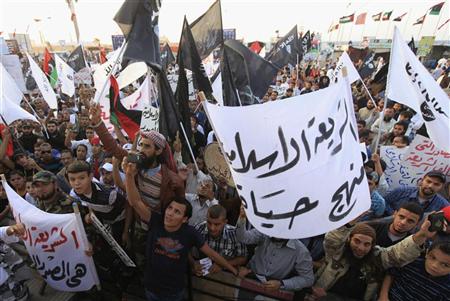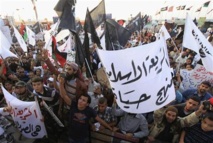Their resignation on Tuesday in protest at persistent lawlessness in Libya since its 2011 uprising came after three weeks of wrangling over an Islamist-inspired censure motion against the premier.
But Zeidan, an independent who himself was the victim of a bungled abduction last year by ex-rebels who toppled the regime of now slain dictator Moamer Kadhafi, vowed to stay at his post.
The Islamists effectively failed to clinch the required 120 votes in the 194-member General National Congress (GNC) -- Libya's top political authority -- to pass the motion against Zeidan.
Ninety-nine lawmakers signed the motion against Zeidan, an independent who still has the backing of 94 GNC members, mostly from the liberal Alliance of National Forces.
But analysts say the vote has weakened the government and will further undermine Zeidan's powers in the future.
"Ali Zeidan... will not be able to get the backing of the National Congress for his decisions because the majority of its members are against him," said political sciences professor Khulud al-Aguili.
The dispute pitting Islamists against liberals threatens "to push the country even more into a dark tunnel," added political analyst Khaled Tajuri.
Zeidan will be put to the test in coming days when he is due to present the 2014 budget to the GNC, with analysts saying lawmakers could throw it out.
The prime minister is also expected to face growing hostility when he tackles a government reshuffle to replace the five Islamists who quit the lineup and other ministers.
'Revenge' or 'political diversion'?
Zeidan had promised repeatedly last summer to undertake a major government reshuffle, after the resignation of his interior minister and to replace the foreign minister who has said he wants to quit.
Now he must also fill the portfolios vacated by the Islamists -- oil, electricity, housing, economy and sport.
The Islamists are waiting for their "revenge" and to derail his efforts when he presents the GNC with a new cabinet lineup, said Aguili.
Analyst Abdelaziz al-Sukni and former government official Mahmud Shammam dismissed the wrangling between Zeidan and the GNC as "political diversion" aimed at bolstering the GNC's grip over Libya.
In July 2012, Libyans chose the GNC in their first free elections after rebels killed and overthrew Kadhafi, giving it an 18-month mandate to steer the country towards general polls after a adopting a constitution.
But the GNC extended its mandate in December until the end of 2014, triggering protests in Libya by demonstrators who warned of a "new revolution" if the transition is flouted.
Zeidan has said he will only quit when there is consensus on a successor to avoid a power vacuum in the country.
Two and a half years after the overthrow of the Kadhafi regime, security and the economy have crumbled in Libya.
Violence killed 643 people last year, amid a sharp rise in crime, according to a parliamentary report that laments a lack of effective policing.
There are almost daily reports of violence across large swathes of the country where ex-rebels rule, including Al-Qaeda-inspired groups which have taken advantage of the lawlessness.
The eastern city of Benghazi, cradle of the 2011 uprising, has seen numerous assassinations of security personnel and judges, as well as a jihadist attack in 2012 against the US consulate that killed ambassador Chris Stevens and three other Americans.
Since last July, security guards at key oil export terminals in the east -- many of them former rebel fighters -- have blockaded exports, delivering a devastating blow to hard currency receipts and government revenues.
The protesters are demanding a restoration of the autonomy the eastern Cyrenaica region enjoyed in the first decade after independence in 1951.
And on Saturday, the GNC declared a state of emergency in the mostly desert south in response to deadly ethnic unrest.
Human Rights Watch has warned of "anarchy" in Libya, saying authorities were unable to impose the rule of law and protect the people.
--------------------------------------------------------------------
But Zeidan, an independent who himself was the victim of a bungled abduction last year by ex-rebels who toppled the regime of now slain dictator Moamer Kadhafi, vowed to stay at his post.
The Islamists effectively failed to clinch the required 120 votes in the 194-member General National Congress (GNC) -- Libya's top political authority -- to pass the motion against Zeidan.
Ninety-nine lawmakers signed the motion against Zeidan, an independent who still has the backing of 94 GNC members, mostly from the liberal Alliance of National Forces.
But analysts say the vote has weakened the government and will further undermine Zeidan's powers in the future.
"Ali Zeidan... will not be able to get the backing of the National Congress for his decisions because the majority of its members are against him," said political sciences professor Khulud al-Aguili.
The dispute pitting Islamists against liberals threatens "to push the country even more into a dark tunnel," added political analyst Khaled Tajuri.
Zeidan will be put to the test in coming days when he is due to present the 2014 budget to the GNC, with analysts saying lawmakers could throw it out.
The prime minister is also expected to face growing hostility when he tackles a government reshuffle to replace the five Islamists who quit the lineup and other ministers.
'Revenge' or 'political diversion'?
Zeidan had promised repeatedly last summer to undertake a major government reshuffle, after the resignation of his interior minister and to replace the foreign minister who has said he wants to quit.
Now he must also fill the portfolios vacated by the Islamists -- oil, electricity, housing, economy and sport.
The Islamists are waiting for their "revenge" and to derail his efforts when he presents the GNC with a new cabinet lineup, said Aguili.
Analyst Abdelaziz al-Sukni and former government official Mahmud Shammam dismissed the wrangling between Zeidan and the GNC as "political diversion" aimed at bolstering the GNC's grip over Libya.
In July 2012, Libyans chose the GNC in their first free elections after rebels killed and overthrew Kadhafi, giving it an 18-month mandate to steer the country towards general polls after a adopting a constitution.
But the GNC extended its mandate in December until the end of 2014, triggering protests in Libya by demonstrators who warned of a "new revolution" if the transition is flouted.
Zeidan has said he will only quit when there is consensus on a successor to avoid a power vacuum in the country.
Two and a half years after the overthrow of the Kadhafi regime, security and the economy have crumbled in Libya.
Violence killed 643 people last year, amid a sharp rise in crime, according to a parliamentary report that laments a lack of effective policing.
There are almost daily reports of violence across large swathes of the country where ex-rebels rule, including Al-Qaeda-inspired groups which have taken advantage of the lawlessness.
The eastern city of Benghazi, cradle of the 2011 uprising, has seen numerous assassinations of security personnel and judges, as well as a jihadist attack in 2012 against the US consulate that killed ambassador Chris Stevens and three other Americans.
Since last July, security guards at key oil export terminals in the east -- many of them former rebel fighters -- have blockaded exports, delivering a devastating blow to hard currency receipts and government revenues.
The protesters are demanding a restoration of the autonomy the eastern Cyrenaica region enjoyed in the first decade after independence in 1951.
And on Saturday, the GNC declared a state of emergency in the mostly desert south in response to deadly ethnic unrest.
Human Rights Watch has warned of "anarchy" in Libya, saying authorities were unable to impose the rule of law and protect the people.
--------------------------------------------------------------------









 Home
Home Politics
Politics











